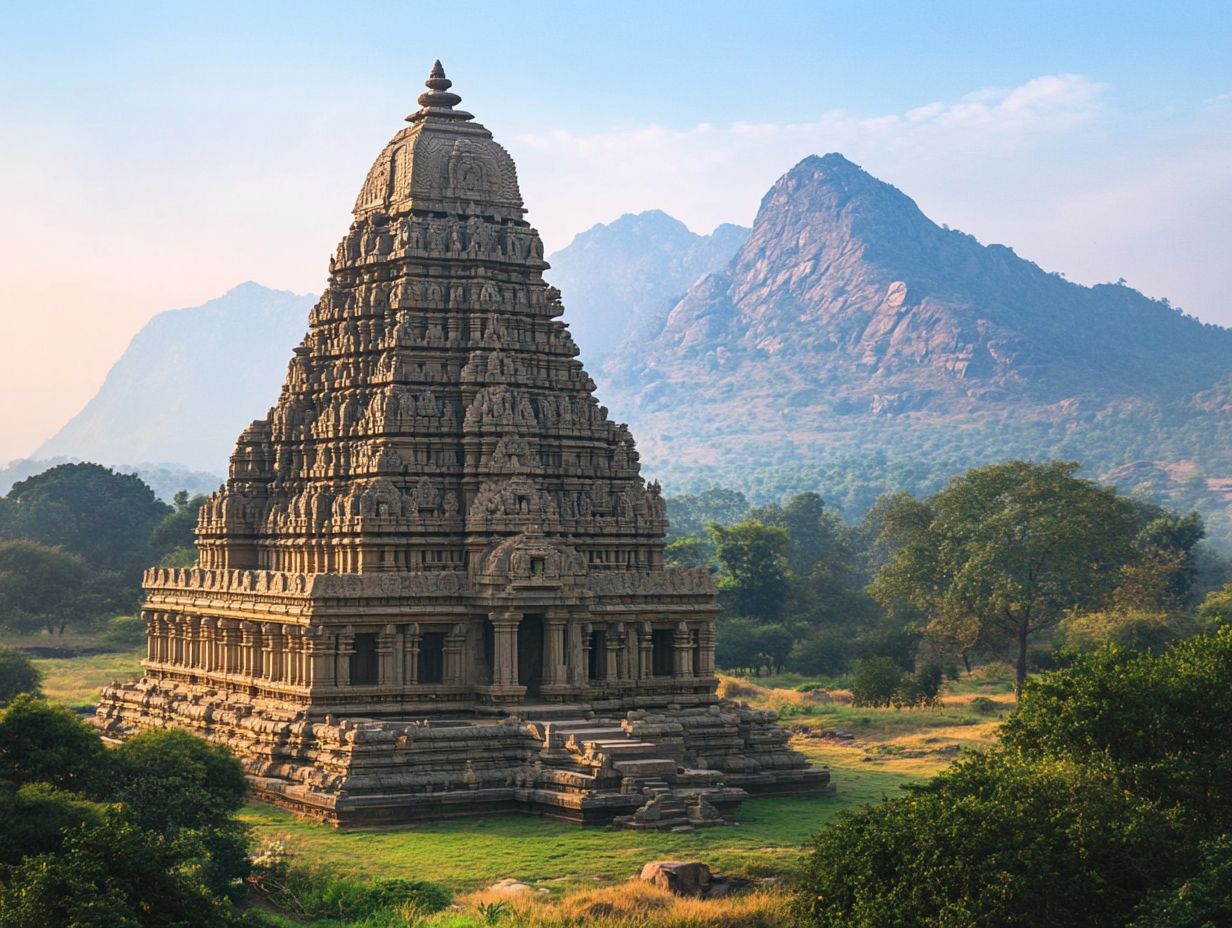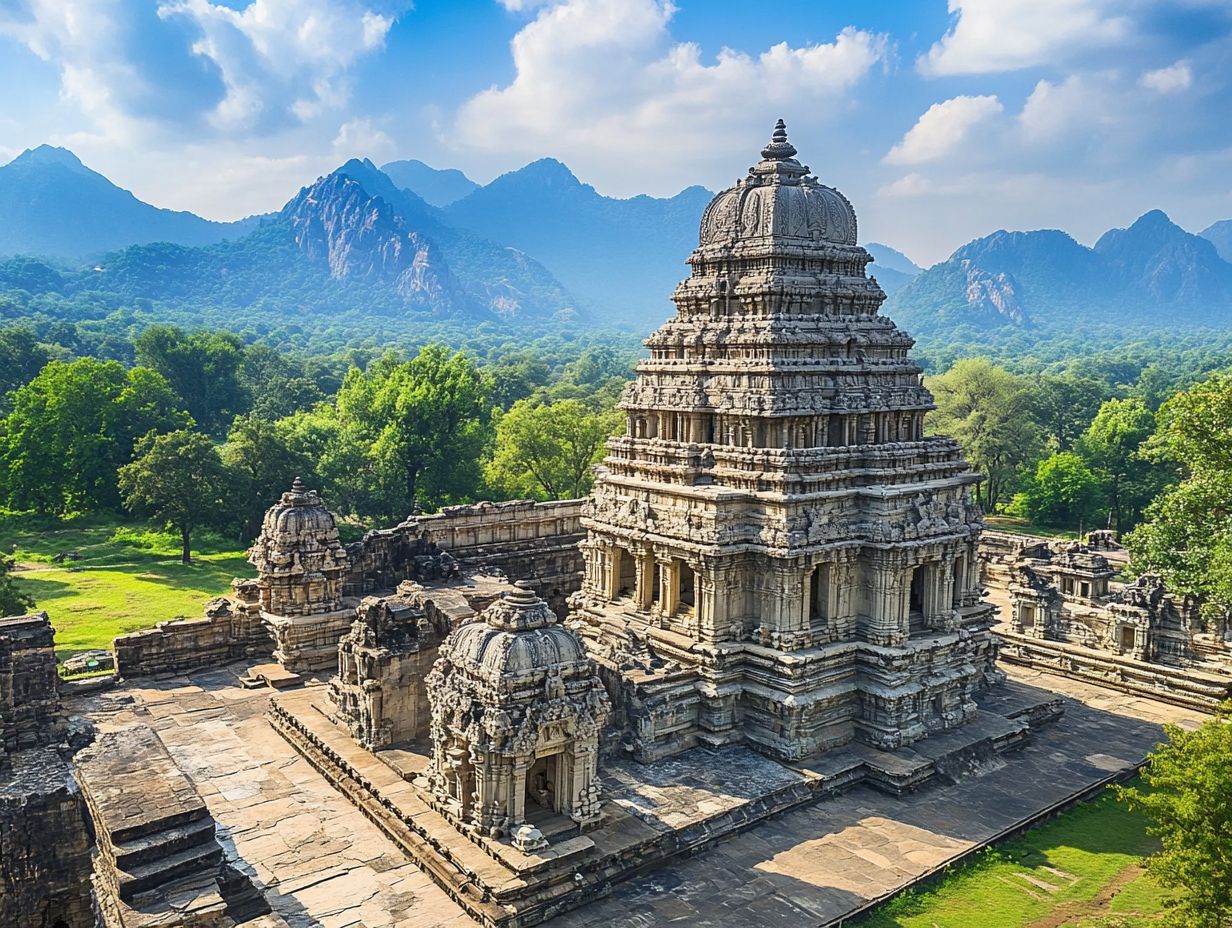Why Is It Difficult to Trace the Origins of Hinduism?
Hinduism, recognized as one of the world’s oldest religions, presents a captivating tapestry of beliefs, practices, and traditions that have evolved over millennia. Understanding its core tenets is crucial, yet tracing its origins unfolds as a complex journey characterized by historical ambiguities, cultural interactions, and the migration theories that enrich its historical context.
This exploration ventures into the evolution of Hinduism, addressing the challenges associated with pinpointing its beginnings and the diverse perspectives regarding its formation. It reveals how these intricacies, including the role of syncretism and cultural assimilation, continue to shape the practice of Hinduism today, enriching its vibrant spiritual landscape.
What is Hinduism?

Hinduism, recognized as one of the world’s oldest religions, weaves a rich tapestry of spiritual traditions and cultural practices. Its origins can be traced back to ancient civilizations such as the Indus Valley, and over the millennia, it has undergone significant evolution, reflecting a diverse array of beliefs and philosophies, including polytheism and monotheism.
At the heart of Hinduism lie its sacred texts, including the Vedas and Upanishads, which offer profound insights into existence, rituals, and ethical living. The religion is distinguished by a vast pantheon of deities, each embodying different facets of the divine and the human experience.
This multifaceted belief system emphasizes key concepts such as Dharma, Karma, and the cycle of reincarnation, which contribute to its enduring relevance in the modern world.
What are the Core Beliefs of Hinduism?
The core beliefs of Hinduism encompass a profound array of philosophical concepts that intricately guide the spiritual and ethical lives of its followers, centering on fundamental ideas such as Dharma, Karma, and the cycle of reincarnation, which are elaborated in the Vedic texts and Upanishads.
These principles are seamlessly woven into the daily practices and rituals of adherents, influencing their interactions and decision-making. For example, the principle of Dharma highlights the significance of duty and righteousness, compelling individuals to act with integrity in both their professional and personal lives. This is especially evident during family gatherings, where rituals honoring deities like Ganesha or Lakshmi underscore the values of respect and responsibility.
In parallel, the doctrine of Karma prompts individuals to reflect on the consequences of their actions, often inspiring acts of kindness or community service that resonate with the teachings found in sacred texts like the Bhagavad Gita. Furthermore, the concept of reincarnation shapes their understanding of life’s challenges, fostering a sense of resilience and moral awareness as they navigate their spiritual journeys.
How Did Hinduism Evolve?
The evolution of Hinduism presents a complex narrative that spans thousands of years, characterized by significant historical developments and cultural transformations. Originating from the ancient Vedic rituals practiced by the Indo-Aryans, the religion has experienced countless transformations shaped by sociopolitical contexts, migrations, and interactions with indigenous beliefs, as well as the expansion of its philosophical schools like Advaita Vedanta.
The historical framework of Hinduism reveals a tapestry woven from diverse regional variations, with syncretism playing a pivotal role in the adaptation and amalgamation of religious practices and philosophies. This dynamic evolution encapsulates the rich cultural heritage that contemporary Hinduism embodies today.
What Were the Earliest Forms of Hinduism?
The earliest forms of Hinduism can be traced back to ancient times, with roots intricately woven into the oral traditions and rituals of the Vedic civilization, where the Vedas emerged as foundational texts that shaped religious practices. These texts not only codified hymns and philosophies but also articulated detailed instructions for the performance of rituals central to both societal and spiritual life.
As communities progressed, their beliefs evolved, influenced by interactions with diverse cultures and the gradual shift from oral history to written records. Archaeological evidence plays a pivotal role in reconstructing this rich tapestry, revealing artifacts and structures that illuminate the lives of early practitioners. Such discoveries give the power to historians and scholars to grasp the significance of ritualistic practices, including sacrifices and communal gatherings, which reflected a society that profoundly valued its connection to the divine and the sacred geography of their land.
How Did Hinduism Develop Over Time?
The development of Hinduism over time is characterized by a rich tapestry of historical contexts and cultural exchanges that have profoundly influenced its beliefs, practices, and sacred narratives.
As the religion has evolved, it has seen the emergence of diverse philosophical schools, including Advaita Vedanta and Yoga, which have enhanced its complexity and depth. Regional variations have also played a pivotal role; local customs, languages, and traditions have intricately woven themselves into the fabric of core Hindu tenets, resulting in a vibrant cultural diversity.
In recent years, globalization has further transformed contemporary practices, facilitating new interpretations and adaptations that resonate with a broader audience. The global Hindu diaspora has also contributed to this evolution, blending traditional practices with modern influences. This dynamic interplay between traditional roots and modern influences continues to redefine the faith’s identity in an increasingly interconnected world.
Why is it Difficult to Trace the Origins of Hinduism?

Tracing the origins of Hinduism poses considerable challenges, primarily due to the intricate historical framework of the religion and the constraints of existing historical evidence. This complexity often results in a plethora of interpretations and theories, reflecting the multifaceted nature of Hinduism’s development over time.
What are the Limitations of Historical Evidence?
The limitations of historical evidence in tracing the origins of Hinduism stem from a lack of comprehensive historical records and the inherent challenges involved in interpreting both archaeological findings and ancient texts. These difficulties are further magnified by the fact that many ancient scriptures were composed centuries after the events they recount, often reflecting the biases or perspectives of their authors rather than providing an objective historical account.
Archaeological discoveries frequently yield fragmented insights into past societies, complicating efforts to construct a coherent narrative of Hinduism’s development. Textual analysis emerges as a crucial tool in navigating these complexities, enabling scholars to examine linguistic patterns, metaphors, and cultural contexts embedded within the writings, including the Vedic texts, Upanishads, Puranas, and the great epics like the Ramayana and Mahabharata.
Additionally, ethnographic studies present a vibrant perspective, capturing the rituals and practices of contemporary adherents that resonate with the beliefs and traditions of early Hinduism. This multidimensional approach ultimately enriches the understanding of Hinduism’s intricate history.
How Did the Lack of a Central Authority Contribute to the Difficulty of Tracing Hinduism’s Origins?
The absence of a central authority in Hinduism has profoundly complicated the task of tracing its origins, as this decentralization has given rise to a plethora of regional variations and sectarian divisions. This lack of a unified structure has permitted diverse interpretations and practices to flourish among different communities, each adapting the foundational tenets of Hinduism to align with their local customs and cultural contexts.
For example, in southern India, devotional practices may predominantly center around South Indian deities, while northern regions might highlight different aspects of the extensive pantheon. This rich pluralism poses significant challenges for historical analysis, as scholars endeavor to reconcile the wide-ranging beliefs and rituals that have evolved over time.
The dynamic nature of local traditions often results in a vibrant tapestry of worship, which mirrors the unique identities of various groups, subsequently influencing community practices and shaping social cohesion in intricate and meaningful ways. This diversity is also evident in the multitude of sects and regional variations found within Hinduism, each contributing to its rich cultural heritage and spiritual practices.
What Role Did Cultural and Religious Interactions Play in the Development of Hinduism?
Cultural and religious interactions have been instrumental in shaping the development of Hinduism, creating an environment ripe for religious syncretism and adaptation across various regions and communities.
This dynamic evolution is particularly evident in the ways Hindu practices and beliefs have assimilated elements from neighboring religious traditions, such as Buddhism and Jainism, as well as from more distant faiths through trade and migration. These exchanges have woven a rich tapestry of rituals, philosophical ideas, and artistic expressions, including sacred symbols and mythological narratives, that resonate with a diverse audience.
The global Hindu diaspora has played a significant role in influencing contemporary expressions of Hinduism, as practitioners adapt their faith to new cultural contexts while preserving its essential tenets. The impact of globalization is profound; it has facilitated cross-cultural interactions that deepen the understanding of Hinduism, allowing for a blending of traditions and the emergence of innovative practices that reflect the complexities of a globalized society.
What are the Different Perspectives on the Origins of Hinduism?
The origins of Hinduism invite a multitude of interpretations, showcasing a rich tapestry of perspectives that encompass traditional beliefs, contemporary scholarly analysis, and various alternative theories put forth by researchers in the field of religious studies.
Each viewpoint contributes to a deeper understanding of this ancient religion, highlighting its complexity and the diverse narratives that surround its inception, including its cultural evolution and historical development.
How do Traditional Hindu Texts Explain the Origins of Hinduism?

Traditional Hindu texts, including the Vedas, Upanishads, and Puranas, offer sacred narratives that elucidate the origins of Hinduism and its core principles. These esteemed scriptures encompass a diverse array of teachings that shed light on the intricate relationship between deities, humanity, and the cosmos, reflecting the polytheism and monotheism within Hinduism.
Through their rich tapestry of mythological tales, including the epic narratives of the Ramayana and Mahabharata, these texts unveil the fundamental beliefs and practices that shape spiritual life. For instance, the Vedas delineate ritualistic practices and philosophical insights, while the Puranas recount the exploits of gods and heroes, thereby enriching an individual’s connection to the divine and contributing to the understanding of Hindu philosophy.
They serve as essential resources for practitioners seeking to grasp the complex framework of dharma, karma, and moksha, as well as concepts like reincarnation and the roles of Brahman and Atman, ultimately guiding them along their spiritual journey.
What do Modern Scholars Say About the Origins of Hinduism?
Modern scholars explore the origins of Hinduism through a rich tapestry of interdisciplinary approaches, meticulously examining historical contexts, such as the Indus Valley civilization, and employing critical analysis to unravel its complex development. They utilize a diverse array of methodologies, including linguistic evidence and historical linguistics, which shed light on the connections between ancient texts and contemporary languages, revealing the evolution of syntax and vocabulary over time.
Anthropological studies offer valuable insights into the rituals, social structures like the caste system, and cultural practices that have shaped the religion throughout the centuries. By weaving together these varied perspectives, including anthropological perspectives and ethnographic studies, researchers enrich the academic discourse surrounding Hinduism, acknowledging its fluid and dynamic nature. This approach challenges established interpretations and invites new inquiries into the religion’s intricate beliefs, traditions, and spiritual practices.
Such evolving scholarship fosters a deeper understanding of how historical, social, and linguistic factors intertwine in the ongoing narrative of this ancient faith, including its sacred texts and spiritual practices, illuminating its place in the broader tapestry of human experience.
What are Some Alternative Theories About the Origins of Hinduism?
Alternative theories regarding the origins of Hinduism have surfaced, presenting various explanations that challenge conventional narratives by integrating indigenous beliefs, migration theories, and cultural influences.
These theories propose that the evolution of Hinduism cannot be solely ascribed to the Vedic texts or the migration of the Indo-Aryans; rather, it emerges from a complex interplay of local customs, regional practices, and significant historical events. For instance, some scholars contend that the rich spiritual landscape of ancient India was profoundly influenced by pre-Vedic tribal beliefs and the interactions among diverse cultures facilitated by trade, conquest, and religious syncretism.
This perspective not only reframes the understanding of Hindu origins but also encourages a broader interpretation of Hinduism itself, promoting the exploration of its multifaceted nature as an evolving entity influenced by religious syncretism, rather than a static tradition defined exclusively by its canonical texts.
How Does the Difficulty of Tracing Hinduism’s Origins Impact its Practice and Beliefs Today?
The complexities involved in tracing the origins of Hinduism profoundly influence its contemporary practice and beliefs, resulting in a rich tapestry of interpretations regarding its spiritual identity, cultural expressions, and religious practices.
Frequently Asked Questions
Why is it difficult to trace the origins of Hinduism?

Hinduism is a complex and diverse religion that has evolved over thousands of years, involving various philosophical schools and traditions, making it difficult to pinpoint a specific origin.
What factors contribute to the difficulty of tracing Hinduism’s origins?
The lack of a central founding figure or single authoritative scripture, as well as the incorporation of various traditions and beliefs, including oral tradition and sacred symbols, make it challenging to determine the exact origins of Hinduism.
Is there any evidence of a specific event or person that marks the beginning of Hinduism?
No, there is no one event or person that can be definitively identified as the start of Hinduism. It has evolved gradually over time through the influence of many different cultures and traditions, showing significant cultural diversity and regional variations.
Are there any theories about the origins of Hinduism?
Yes, there are various theories proposed by scholars, such as the migration of Indo-Aryans from Central Asia, comparative religion analyses, or the development of indigenous beliefs in the Indus Valley region.
Why is the origin of Hinduism still debated among scholars?
Since there is no single founder or central text, and the religion has evolved over time through religious syncretism and sociopolitical factors, there is no consensus among scholars about the exact origins of Hinduism.
Does the difficulty of tracing Hinduism’s origins affect its significance or validity as a religion?
No, the rich and diverse history of Hinduism does not impact its significance or validity as a religion. The value and importance of Hinduism lies in its teachings, beliefs, and practices, such as meditation and yoga, rather than a specific origin story.
